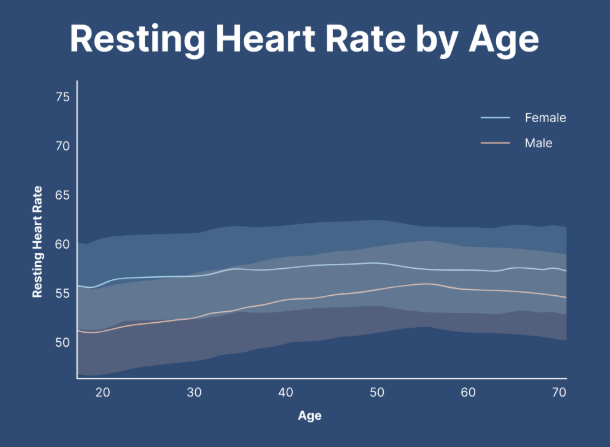Understanding your sleeping heart rate is a powerful way to monitor your health. While we often focus on our resting heart rate during the day, the rate at which our heart beats while we sleep can provide even deeper insights into our cardiovascular fitness, recovery, and overall well-being. As an SEO expert specializing in health content, I've created this comprehensive guide to help you understand what a normal sleeping heart rate looks like, how it changes with age, and what it all means for your health.
What is a Normal Sleeping Heart Rate?
Your sleeping heart rate, also known as your nocturnal heart rate, is typically lower than your daytime resting heart rate. This is because during sleep, your body enters a state of deep relaxation, your metabolic rate decreases, and your parasympathetic nervous system (the “rest and digest” system) takes over. For most healthy adults, a normal sleeping heart rate falls between 40 and 60 beats per minute (bpm).
A lower sleeping heart rate often indicates a healthier heart that is more efficient at pumping blood. A heart that is in great condition doesn't have to work as hard to circulate blood when your body is at rest.
Sleeping Heart Rate vs. Resting Heart Rate
It's important to distinguish between these two metrics:
- Resting Heart Rate (RHR): Measured when you are awake but calm and at rest, usually first thing in the morning. A normal RHR for adults is generally 60-100 bpm.
- Sleeping Heart Rate: Measured when you are asleep. It's often considered a more accurate and stable measure of your heart's health because it isn't influenced by daily stressors, caffeine, or minor physical movements.
Normal Sleeping Heart Rate by Age: A Detailed Breakdown
Your heart rate naturally changes throughout your life. Here's a general breakdown of what's considered a normal sleeping heart rate by age group.
| Age Group | Normal Sleeping Heart Rate (bpm) | Notes |
| Newborns (0-3 months) | 100-150 | Infants have a very fast heart rate due to rapid growth and a high metabolic rate. |
| Infants (3-12 months) | 90-120 | The heart rate begins to decrease as the baby grows. |
| Children (1-5 years) | 80-110 | Still higher than adults but continues to slow down. |
| Children (6-12 years) | 70-100 | Starts to approach the adult range. |
| Adolescents (13-18 years) | 60-90 | Typically within the adult range, but can vary greatly. |
| Adults (18-65 years) | 40-60 | This is the standard range for a healthy adult. A lower rate often indicates better fitness. |
| Older Adults (65+) | 40-60 | May be slightly higher or lower depending on fitness level and health conditions. |
What Can Influence Your Sleeping Heart Rate?
Several factors can affect how fast your heart beats while you're asleep, providing clues about your lifestyle and health:
- Physical Fitness: Highly conditioned athletes often have a very low sleeping heart rate, sometimes as low as 40 bpm or even slightly below, due to a strong and efficient cardiovascular system.
- Stress and Anxiety: High stress levels can keep your nervous system in a state of high alert, preventing your heart rate from dropping as low as it should during sleep.
- Sleep Quality: Poor quality sleep, interrupted sleep, or conditions like sleep apnea can prevent your body from reaching the deep, restorative sleep stages where your heart rate is at its lowest.
- Alcohol and Caffeine: Consuming alcohol or caffeine, especially close to bedtime, can elevate your heart rate and disrupt your sleep patterns.
- Medications and Health Conditions: Certain medications, as well as conditions like thyroid issues, can directly impact your heart rate.
How to Measure and Interpret Your Sleeping Heart Rate
The easiest and most accurate way to track your sleeping heart rate is with a wearable device, such as a smart ring, fitness tracker, or smartwatch. These devices provide continuous monitoring throughout the night, offering detailed graphs and data that you can review in the morning.
Interpreting the data:
- Establish a Baseline: Track your heart rate for several nights to establish what is normal for you.
- Look for Trends: Is your sleeping heart rate consistently high? Or is it dropping lower as you get more physically fit? Look for changes over time.
- Cross-Reference with Other Data: Combine your heart rate data with sleep quality metrics, stress levels, and daily activity to get a complete picture. For example, a high sleeping heart rate might correlate with a stressful day or a poor night's sleep.
When Should You Be Concerned?
While occasional fluctuations are normal, consistently high or low sleeping heart rates (outside the normal range for your age and fitness level) could be a signal from your body.
- A consistently high sleeping heart rate might indicate chronic stress, poor recovery, dehydration, or an underlying health issue.
- An unusually low sleeping heart rate (bradycardia) can be a sign of excellent fitness, but if you are not an athlete and experience symptoms like dizziness, fatigue, or fainting, it could be a sign of a heart condition.
If you have any concerns, it's always best to consult with a healthcare professional. They can provide a proper diagnosis and personalized advice based on your individual health profile.
Frequently Asked Questions (FAQ)
Q1: Is a sleeping heart rate of 70 bpm normal for an adult?
A: For a healthy adult, a sleeping heart rate of 70 bpm is generally considered higher than the optimal range. While it's not a direct cause for alarm on its own, it could be a sign of poor cardiovascular fitness, stress, or other lifestyle factors.
Q2: How can I lower my sleeping heart rate?
A: To lower your sleeping heart rate, focus on improving your overall health. This includes regular exercise, stress management techniques (like meditation or deep breathing), improving sleep hygiene, and limiting caffeine and alcohol, especially in the evening.
Q3: Why is my sleeping heart rate higher after drinking alcohol?
A: Alcohol consumption, particularly close to bedtime, can elevate your heart rate because your body works to metabolize the alcohol, which puts a strain on your system. This often leads to a higher-than-normal sleeping heart rate and disrupts the quality of your sleep.
Q4: Does sleep apnea affect sleeping heart rate?
A: Yes. Sleep apnea, a condition where your breathing repeatedly stops and starts during sleep, can cause significant fluctuations in your sleeping heart rate. These episodes can lead to sudden drops and spikes in heart rate, preventing it from reaching a consistent, low level.
Q5: Can a high sleeping heart rate indicate that I'm getting sick?
A: A slightly elevated sleeping heart rate can sometimes be an early sign that your body is fighting off an illness. Your immune system works to combat the infection, which can lead to an increased metabolic rate and a higher heart rate.









